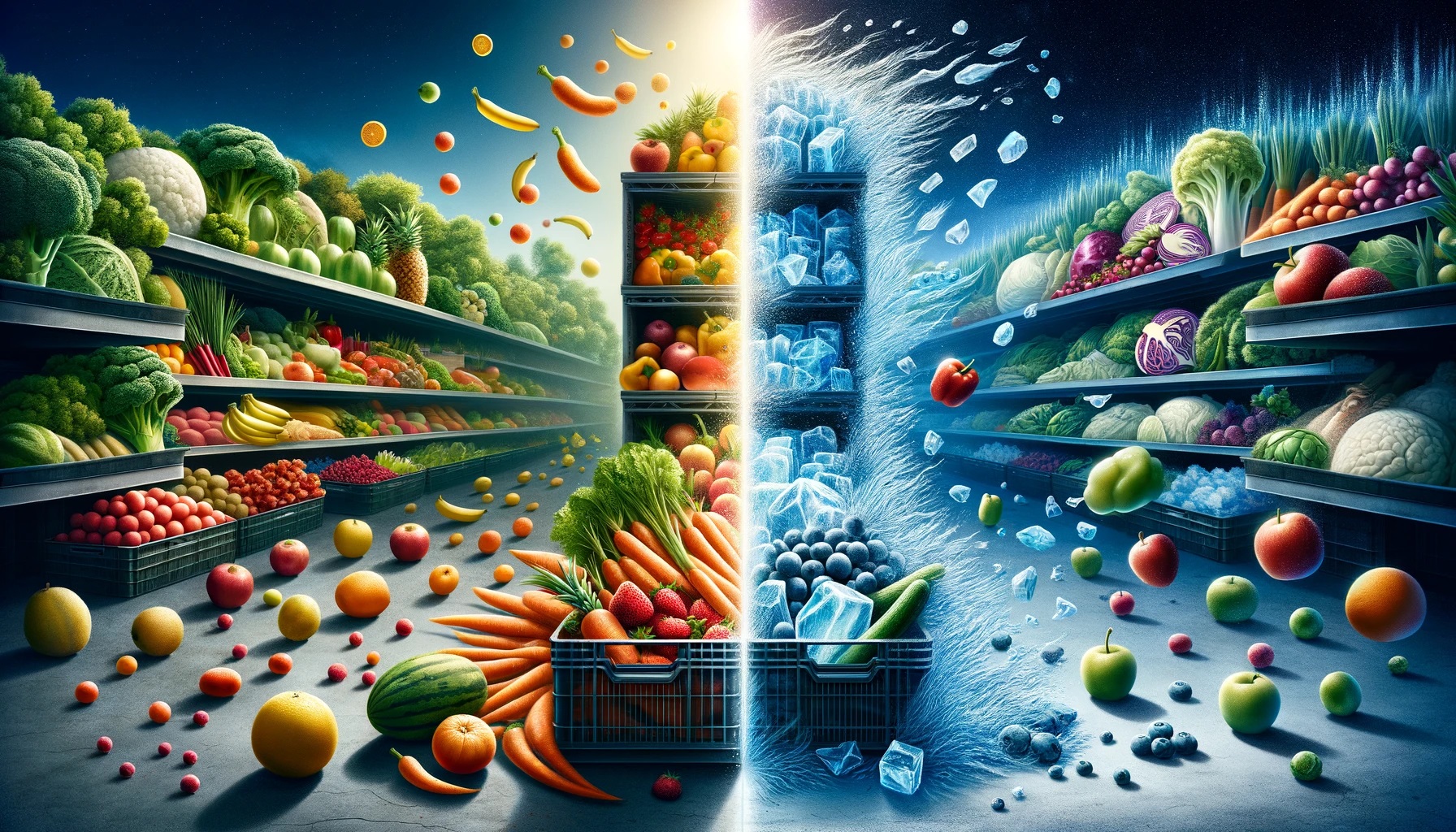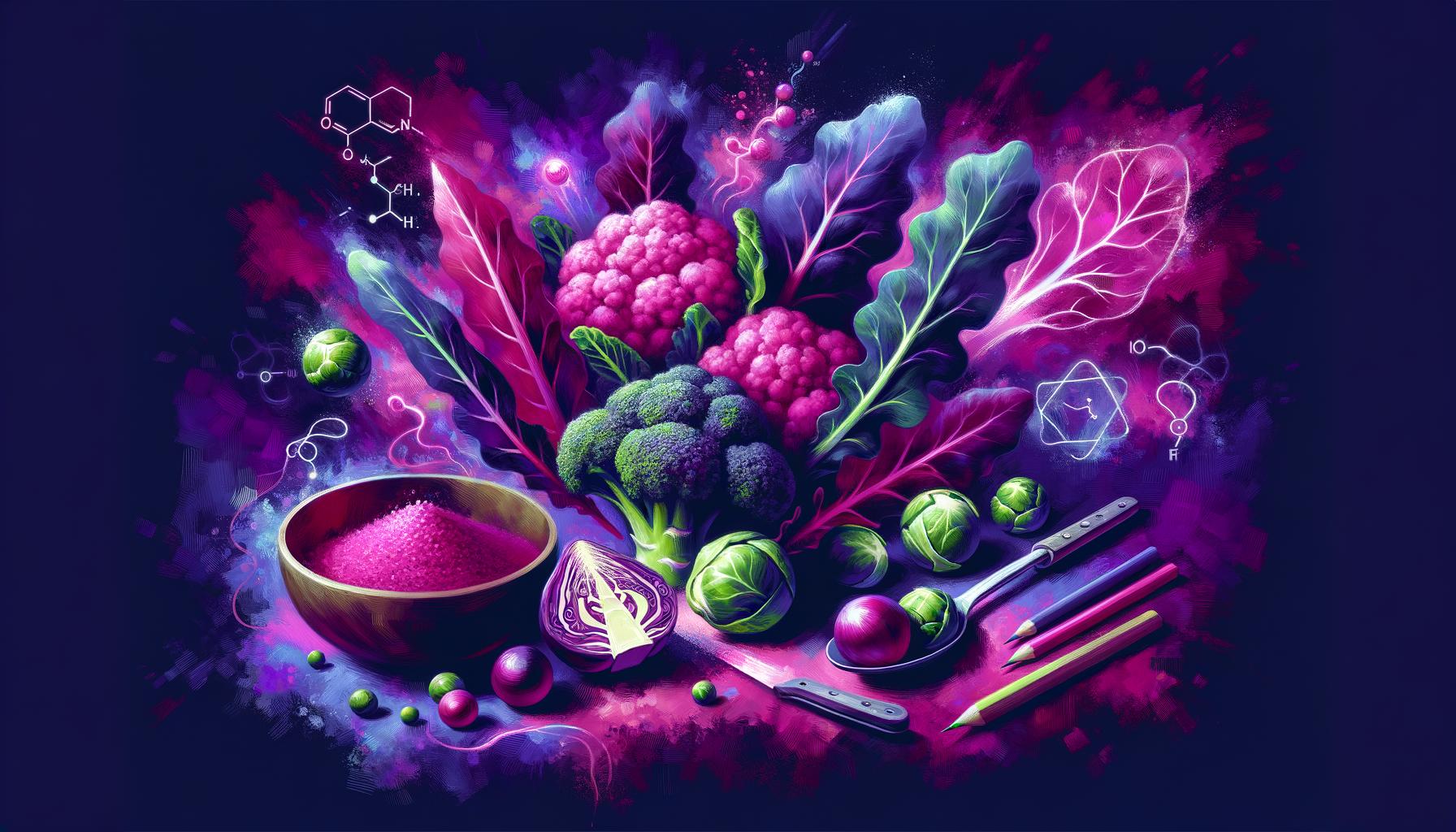· nutrition · 16 min read
Nutritional Value of Frozen Produce vs. Fresh
Explore the dynamics between frozen and fresh produce in terms of nutrition, covering the flash-freezing process and its implications for your diet.

In This Post
The Fact Why Should I Care How To Put In Action Start Tomorrow Guide How does it effect my ability to focus How does it impact my daily life How does it help me make friends How does it help me manage stress How does it effect my mood Summary: Remember Refresher Checklist The Full Research Article CitationsPrint Out The Tomorrow Checklist!
Sign up for our newsletter and receive a copy today, so that, you can start tomorrow! Or the next day, or the day after that. I forget everything and starting things is hard at least for me so these checklists are godsend.
Print Out The Remember Refresher Checklist!
Sign up for our newsletter and download your own copy of the Remember Refresher Checklist, so that, you can easily put it on your fridge and help you stay on target towards your WHY. Every little bit helps.
Introduction
Overview of Frozen vs. Fresh Produce Nutrition
The nutritional comparison between frozen and fresh produce is a topic of much discussion among health enthusiasts and professionals alike. The key question centers around whether frozen fruits and vegetables are nutritionally equivalent to their fresh counterparts. This debate encompasses various factors such as nutrient content, availability, and convenience, all of which play significant roles in our dietary choices.
The common perception that fresh produce is always nutritionally superior to frozen is a misconception that neglects the scientific advancements in the preservation of food. Flash-freezing, a pivotal process in preserving frozen produce, has revolutionized the way we store and consume fruits and vegetables. This method locks in the nutritional value of produce at its peak ripeness, ensuring that the essential vitamins, minerals, and antioxidants are retained until consumption.
Key Points to Consider:
- Seasonal Variations: Fresh produce may not always be in season, affecting its nutritional content due to long transport times and storage methods before it reaches consumers.
- Nutrient Retention: Flash-freezing helps in preserving essential nutrients, making frozen produce a valid and sometimes superior alternative in terms of vitamin and mineral content.
- Convenience and Waste Reduction: Frozen produce offers a convenient and waste-reducing approach to consuming a variety of fruits and vegetables, regardless of seasonal availability.
The Process of Flash-Freezing and Its Importance
Flash-freezing represents a technological marvel in food preservation, where fruits and vegetables are subjected to extremely low temperatures immediately after harvesting. This rapid freezing process is crucial for several reasons:
- Preservation of Nutrients: The swift nature of flash-freezing means that the degradation of nutrients is significantly slowed down, helping retain the original nutritional content.
- Texture and Quality Maintenance: By preventing the formation of large ice crystals within the cellular structure of the produce, flash-freezing ensures that texture and quality are maintained.
- Extended Shelf Life: It enables consumers to enjoy their favorite fruits and vegetables year-round, without worrying about the quick spoilage associated with fresh produce.
Checklist for Choosing Between Fresh and Frozen Produce:
- Consider seasonal availability and potential nutrient degradation of fresh produce during transportation.
- Evaluate the convenience factor and potential waste reduction when opting for frozen produce.
- Take into account the type of nutrients and the impact of flash-freezing on their preservation.
Understanding the nuances of flash-freezing not only illuminates the process’ importance in nutrition but also challenges preconceived notions about fresh produce always being the superior choice. With advancements in food technology, frozen fruits and vegetables stand as a testament to the possibility of combining convenience, nutrition, and sustainability.
The Science Behind Freezing Fruits and Vegetables
Understanding Flash-Freezing Technology
At the core of the frozen produce industry lies a pivotal technology known as flash-freezing. This method, also referred to as blast freezing, quickly freezes the fruits and vegetables soon after they are harvested. The speed of this process is crucial; it ensures that the ice crystals formed within the food are very small, minimizing damage to the cell structure. Thus, the original quality, texture, and most importantly, the nutritional value of the produce are maintained to a great extent.
Flash-freezing works by exposing the fresh produce to extremely low temperatures, typically below -30°C (-22°F), in a very short period. This rapid temperature drop is achieved through the use of liquid nitrogen or carbon dioxide. Unlike traditional freezing methods, which can take hours and result in larger, damaging ice crystals, flash-freezing secures the quality and freshness of the produce as closely as possible to its natural state.
Nutrient Preservation in Frozen Produce
The effectiveness of flash-freezing in preserving the nutritional value of fruits and vegetables is remarkable. Thanks to this technology, frozen produce can retain vitamins and minerals almost as efficiently as their fresh counterparts. In some instances, frozen fruits and vegetables may even offer superior nutrient retention, especially since produce begins to lose its nutritional value from the moment it is harvested.
Vitamins such as Vitamin C and the B group are particularly vulnerable to the effects of air, light, and heat. Flash-freezing helps in preserving these water-soluble vitamins, which are often lost during traditional processes of storage and transportation of fresh produce. Similarly, antioxidant levels, crucial for protecting the body against free radicals, are effectively maintained in frozen fruits and vegetables.
Comparative Studies: Frozen vs. Fresh Nutrient Levels
Various studies have been conducted to compare the nutrient levels in frozen versus fresh produce, yielding some enlightening results:
- Researchers have found that the vitamin content and antioxidants in frozen produce often equal or surpass that of fresh items. This is largely due to the degradation of nutrients in fresh produce during the period between harvest and consumption.
- A study published in the Journal of Agricultural and Food Chemistry observed that there were no consistent differences between fresh and frozen in terms of vitamin and mineral content. In fact, in some cases, frozen fruits and vegetables provided higher levels of antioxidants, including vitamin C, polyphenols, anthocyanins, lutein, and beta-carotene.
Given the convenience and nutrient retention offered by flash-frozen fruits and vegetables, incorporating them into a balanced diet can be both a healthy and practical choice. It’s important, however, to be mindful of the distinctions between various frozen products and opt for those without added sugars or sauces that can detract from their nutritional value.
Checklist for Selecting High-Quality Frozen Fruits and Vegetables:
- Choose plain frozen fruits and vegetables without added sugars or seasonings.
- Look for products that have been flash-frozen to ensure maximum nutrient preservation.
- Check the packaging for any signs of freezer burn or ice crystals, which may indicate that the product has thawed and been refrozen.
- Opt for organic options where possible, to avoid exposure to pesticides and chemicals.
- Pay attention to the expiration date to ensure you’re getting the freshest frozen produce available.
Advantages of Frozen Produce
Frozen fruits and vegetables come with a myriad of benefits that go beyond just nutrient preservation. These benefits make them a convenient and sustainable option for many consumers, emphasizing their importance in a balanced diet.
Peak Ripeness: Locking in Nutrients and Flavor
One of the primary advantages of frozen produce is that they are picked and flash-frozen at their peak ripeness, a stage when they are most nutrient-packed and flavorful. This process ensures that they retain their vitamins, minerals, and natural taste until they are defrosted and consumed. Unlike fresh produce, which might lose nutrients during transport and shelf storage, frozen fruits and vegetables maintain their quality and offer health benefits similar to their fresh counterparts.
Reducing Food Waste with Longer Shelf Life
Another significant advantage of frozen produce is its contribution to reducing food waste. Fresh produce can spoil quickly, leading to a significant amount of waste. Frozen fruits and vegetables, on the other hand, have a much longer shelf life. They can last for several months without losing their nutritional value, flavor, or texture, making them a reliable pantry staple for reducing waste.
- Buy fruits and vegetables in bulk and freeze them to avoid frequent shopping trips.
- Label frozen produce with dates to keep track of their freshness.
- Incorporate frozen fruits and vegetables into daily meals to ensure a constant supply of nutrients.
Economic and Accessibility Benefits
Frozen produce also offers economical and accessibility advantages. They are generally less expensive than fresh produce, especially when considering seasonal variations and geographical availability. This makes them a cost-effective option for families looking to eat healthily without breaking the bank.
Furthermore, frozen fruits and vegetables make healthy eating more accessible. They are available year-round, providing people in areas with limited fresh produce access the opportunity to enjoy a variety of fruits and vegetables. This is particularly beneficial for individuals living in food deserts, where fresh produce options are scarce.
Overall, the availability of frozen produce contributes to nutritional security by offering everyone the chance to consume a diversity of vegetables and fruits irrespective of the season or their location.
Common Misconceptions About Frozen Produce
Debunking Myths: Taste and Texture Concerns
When discussing frozen produce, one of the most prevalent misconceptions revolves around its taste and texture. Many consumers operate under the belief that freezing fruits and vegetables inherently degrades their taste and texture, rendering them inferior to their fresh counterparts. This notion, however, fails to account for the advancements in flash-freezing technology that preserve the cellular structure of the produce, thus maintaining its original flavor and mouthfeel.
It’s important to differentiate between improper freezing and thawing practices at home, which can indeed affect texture and taste, and the commercial flash-freezing process. Flash-freezing rapidly brings the temperature of the produce down, minimizing ice crystal formation which is the main culprit behind texture changes. Therefore, when properly thawed, flash-frozen fruits and vegetables can retain a taste and texture that is remarkably close to fresh.
Moreover, the perception of taste is often influenced by the quality of the produce at the point of freezing. Fruits and vegetables that are frozen at peak ripeness, an industry standard, are likely to taste better than out-of-season fresh produce that has traveled long distances.
The Truth About Additives in Frozen Produce
Another widespread myth is that frozen produce contains various additives, from preservatives to enhance shelf life, to artificial colors and flavors to compensate for nutrient loss during freezing. However, the truth is quite different:
- Most frozen fruits and vegetables are additive-free. The freezing process itself acts as a natural preservative, eliminating the need for additional chemicals.
- Labeling laws require any additives to be listed on the packaging. Consumers concerned about additives can easily check the ingredient list on the packaging, which often reveals nothing but the fruit or vegetable itself.
Freezing vs. Fresh: Understanding the Real Nutritional Differences
Comparing the nutritional content of frozen and fresh produce isn’t straightforward, as several factors can influence the results. However, numerous studies have shown that the differences in vitamin and mineral content between fresh and properly frozen produce are minimal.
- Nutrient retention in frozen produce can be higher for some vitamins, such as vitamin C and some B vitamins, which are sensitive to the degradation effects of light and air exposure.
- Enzyme activity in fresh produce can lead to nutrient degradation over time, especially if the produce is stored for several days before consumption. In contrast, freezing inhibits these enzymes, helping to preserve nutrient profiles.
Checklist for Overcoming Misconceptions About Frozen Produce:
- [] Recognize that taste and texture concerns often stem from improper home freezing and thawing methods.
- [] Understand that commercial flash-freezing techniques aim to preserve the quality of the produce.
- [] Read packaging labels to verify the absence of unwanted additives.
- [] Compare the nutritional content of fresh and frozen produce based on peer-reviewed scientific research, rather than anecdotal evidence.
In conclusion, myths surrounding frozen produce largely stem from misconceptions about the freezing process and its impact on taste, texture, and nutritional content. By addressing these myths with facts and demonstrating the technological advancements in freezing, we can appreciate the true value that frozen fruits and vegetables bring to a balanced diet.
FAQs (Based on “People Also Ask” Section from Google)
How Does the Nutritional Content of Frozen Produce Compare to Fresh?
When discussing the nutritional content of frozen produce in comparison to fresh, it’s vital to acknowledge that the differences are often minimal. Flash-freezing technology, utilized shortly after harvest, helps in preserving most of the vitamins and minerals. In some cases, frozen fruits and vegetables may even retain nutrients better than fresh produce that has been stored for several days, due to nutrient degradation over time in fresh produce. Studies indicate that nutrients such as Vitamin C, which is volatile and can easily degrade when exposed to air, light, or heat, are well-preserved in frozen produce. This makes frozen fruits and vegetables a viable, nutrient-rich option for those looking to maintain a healthy diet.
Can Freezing Produce Harm Its Antioxidant Content?
The impact of freezing on the antioxidant content of produce is a concern for many health-conscious consumers. It’s reassuring to know that freezing does not significantly harm the antioxidant properties of fruits and vegetables. In fact, the freezing process can help maintain these beneficial compounds. Research has demonstrated that the levels of certain antioxidants, such as anthocyanins and polyphenols, remain stable or even increase in frozen produce. This preservation of antioxidants adds to the appeal of including frozen fruits and vegetables in one’s diet, especially when specific produce is out of season.
What Are the Best Practices for Storing Frozen Fruits and Vegetables?
Proper storage of frozen fruits and vegetables is crucial for maintaining their quality, texture, and nutritional value. Following best practices for freezer storage can extend shelf life and ensure that you’re getting the most out of your frozen produce. Here is a checklist of best practices:
- Ensure your freezer is set to 0°F or lower to properly preserve your frozen produce.
- Keep frozen fruits and vegetables in their original packaging or transfer them to airtight, freezer-safe containers or bags to prevent freezer burn.
- Label and date your frozen produce to help keep track of their storage time.
- Avoid placing warm food directly into the freezer. Allow it to cool down first to maintain the freezer’s temperature.
- Regularly organize and check your freezer to rotate older items to the front, ensuring they are used first.
- Thaw frozen produce in the refrigerator or microwave, rather than at room temperature, to preserve quality and prevent bacterial growth.
Adhering to these storage guidelines helps in maximizing the shelf life and nutritional benefits of frozen fruits and vegetables, making them an excellent choice for healthy eating year-round.
Conclusion: The Nutritional Edge of Frozen Produce
In rounding off our exploration of the nutritional journey from fresh to frozen, it’s paramount to underscore the innovative strides made in preserving the vitamins, minerals, and overall goodness packed in fruits and vegetables through flash-freezing. The compelling evidence laid out throughout this discourse merits a favorable view towards frozen produce, not as a mere substitute for fresh produce but as a viable, sometimes superior, alternative. Here are the essentials that crystallize our findings:
Flash-frozen fruits and vegetables retain most of their nutrient value, thanks to the rapid freezing process that inhibits enzyme activity, which would otherwise degrade their nutritional content. This is especially significant for vitamins that are sensitive to heat and air exposure, such as Vitamin C and several B vitamins.
Nutrient retention levels in frozen produce often outmatch those found in their fresh counterparts that have been stored for several days post-harvest. The significant loss of nutrients in fresh produce during storage and transportation underscores the efficiency of freezing as a preservation method.
The frozen food benefits extend beyond just nutritional retention to encompass waste reduction, economic savings, and enhanced accessibility to a variety of fruits and vegetables year-round, irrespective of their seasonal availability.
With frozen produce shelf life considerably longer than fresh produce, households have the luxury of less frequent shopping trips, contributing further to the reduction of food waste and offering a sustainable option for maintaining a healthy diet.
Eating healthy with frozen foods is not just a matter of convenience but also opens up a realm of culinary creativity. Frozen fruits and vegetables are ready to be thrown into recipes ranging from smoothies to stews, making nutritionally balanced meals more attainable.
To ensure you are making the most of the nutritional benefits offered by frozen produce, here’s a quick checklist to guide you:
- Opt for plain frozen fruits and vegetables: Avoid products with added sugars or seasonings to benefit fully from their natural nutrients.
- Integrate frozen produce in your daily diet: Make them a staple in your smoothies, soups, stews, and stir-fries to ensure a consistent intake of vitamins and minerals.
- Store properly: Ensure your freezer is operating at the right temperature and that the produce is sealed properly to prevent freezer burn.
- Mind the cooking method: Steaming or microwaving rather than boiling can preserve more nutrients during the cooking process.
Frozen produce, with its convenience, cost-effectiveness, and nutrient preservation, stands as an invaluable resource in modern-day nutritional practices. The imperative now is not just to recognize its merits but to incorporate these frozen gems into our diets more conscientiously. As the tides of nutrition science continue to unfold the myriad benefits of frozen foods, let this knowledge empower your choices towards a healthier, more sustainable lifestyle.
Relevant External Links to Extend Your Knowledge on Frozen Produce
In our journey to understand the nutritional value and benefits of frozen produce versus fresh, we’ve explored various facets from the science behind freezing, advantages, misconceptions, and practical tips. To further enhance your comprehension and provide additional resources for your consideration, we present three reputable external links. These websites offer in-depth insights, research findings, and practical advice about frozen foods, their safety, storage, and nutritional aspects.
1. American Frozen Food Institute - “Understanding the Benefits of Frozen Foods”
The American Frozen Food Institute is a key resource for anyone looking to deepen their understanding of frozen foods. Their article on “Understanding the Benefits of Frozen Foods” sheds light on the extensive benefits of frozen produce, emphasizing not only the nutritional aspects but also the convenience, economic advantages, and waste reduction associated with frozen foods. This resource is especially useful for debunking common myths and revealing how frozen produce can be a vital part of a healthy diet.
2. Harvard Health Publishing on Freezing and Food Safety - “Freezing and Food Safety Facts”
Harvard Health Publishing’s article on freezing and food safety is an essential read for anyone concerned about the safety and quality of frozen foods. This resource provides scientifically-backed information on how freezing affects food quality, nutritional value, and safety. It’s an excellent resource for understanding the processes that keep frozen foods safe to eat and how to handle them properly from purchase to plate.
3. EatRight.org on Storing Frozen Foods - “Best Practices for Freezer Storage”
For practical advice on making the most out of your freezer, EatRight.org’s guide on freezer storage is invaluable. Their “Best Practices for Freezer Storage” offers a comprehensive checklist for storing frozen fruits and vegetables, ensuring they retain their nutritional value, flavor, and texture. This guide is particularly beneficial for those new to incorporating frozen produce into their diets or looking to optimize their food storage practices.
- Familiarize yourself with the different freezing technologies
- Understand the nutritional benefits of including frozen produce in your diet
- Learn best practices for storing frozen fruits and vegetables
- Explore ways to incorporate frozen produce into your meals seamlessly
- Stay informed about food safety protocols for handling and preparing frozen foods
The knowledge and insights provided by these resources complement the information we’ve covered in our series. They serve as a valuable tool in not only appreciating the nutritional value of frozen produce versus fresh but also in making informed choices about incorporating frozen foods into a balanced, healthy diet. Whether you’re a seasoned cook or just beginning to explore the benefits of frozen produce, these links offer a wealth of information to support your nutritional journey.
- flash-frozen-fruits-and-vegetables
- nutrient-retention
- frozen-food-benefits
- fresh-vs-frozen-produce-nutrients
- antioxidants-in-frozen-produce
- vitamin-content-frozen-vs-fresh
- frozen-produce-shelf-life
- eating-healthy-with-frozen-foods
- freezer-storage-tips-for-vegetables
- cost-effectiveness-of-frozen-vegetables
- seasonal-availability-and-frozen-produce
- frozen-organic-fruits-and-vegetables
- reducing-waste-with-frozen-produce
- cooking-with-frozen-produce
- texture-changes-in-frozen-fruits





